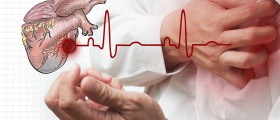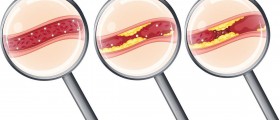
What is a Heart Attack?
Myocardial infarction is dying of the small or large part of heart muscle caused by insufficient blood supply.
Coronary artery is the blood vessel that supplies the heart with blood and oxygen. Its congestion reduces supplying the heart with oxygen, causing heart muscle damage which leads to chest pain and pressure. If blood flow is not established in coronary artery in 20 to 40 minutes, extinction of the heart muscle begins. Heart muscle is dying during the next 6 to 8 hours, being replaced by scar tissue. The development of myocardial infarction brings the risk of sudden death due to cardiac deadlock. The biggest risk is present in the early hours of the myocardial infarction occurrence.What Causes a Heart Attack?
Arteriosclerosis is a gradual process of creating cholesterol layers on the arteries walls. Cholesterol deposits cause thickening of artery walls, and reducing their volume. These arteries cannot deliver enough blood for the normal functioning of body parts. Arteriosclerosis may be hidden for years or decades, not causing any symptoms or health problems. It can appear even in the teenage age, but symptoms usually appear in the mature period. Arteriosclerosis occurs before heart attack in 90-95% of cases. Secondary factors that cause heart attack include: Age – heart attack most often affects people of middle and old age. Gender - men are more often affected by heart attack than women. Estrogen prevents the development of arteriosclerosis in women. Hereditary factor Profession - there is no specific profession that leads to a heart attack. But, people with stressful and responsible job are more prone to this disease. Being overweight - is often associated with the development of arteriosclerosis. Nicotine – nicotine is a Vasoconstrictor which contains chemicals that damage the blood vessels walls. Heart attack may occur at any time, but usually occurs between 4 and 10 hours in the morning due to a higher level of adrenaline in the blood that is released in the early morning hours.Symptoms of a Heart Attack Heart attack causes a strong, sudden and prolonged pain in the area of the heart. It takes at least half an hour and sometimes takes several hours. Chest pain is often described as "pressure" or "tightening". It can be spread to the left (less commonly right) shoulder and arm, neck and jaw. Some patients feel pain in the upper part of the abdomen. Other symptoms of heart attack include: pale or dewy skin and sweating, nausea and vomiting, and shortness of breath.

















Your thoughts on this
Loading...